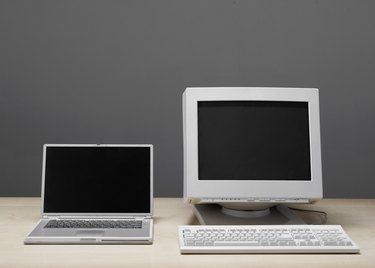
The history of computing predates silicon microchips and CPUs by hundreds of years. The modern computers we are all familiar with can trace their roots back to simple computational machines that seem far removed from what we think of as a computer today.
Simple Computers
Video of the Day
By definition, a computer is any device capable of performing mathematical equations or calculations. Therefore, many simple devices such as an abacus (which dates back to at least 300 BCE) or a slide rule (first made in England in the 1630s) are the forerunners of today's modern computers.
Video of the Day
The Calculating Clock
The first machine that worked like a computer was a gear-powered German device dubbed the Calculating Clock. It was first created by Wilhelm Schickard in 1623, and it operated by pulling or pushing rods set inside a glass case. A similar device known as a Pascaline became popular in the 1640s. These two devices were the forerunners of a steam-powered "difference engine" that was a pet project of Charles Babbage in the 1820s.
Harvard Mark-1
In 1944, the Harvard Mark-1 computer is completed. This computer is closer to a modern computer, but is really just a large calculator driven by a camshaft with no stored programs. This massive computer filled a large room and was a joint effort between Harvard University and IBM.
ENIAC
Another important computer dating from the 1940s is the ENIAC, which was built between 1943 and 1945. ENIA (Electronic Numerical Integrator and Calculator) was a project of the University of Pennsylvania, and spanned many rooms and used nearly 20,000 vacuum tubes.
The Dawn of the Microprocessor
A microprocessor is a chip that basically contains an entire computer (or at least a 1940's era computer) using a integrated circuit. The first microprocessor was made by Intel in 1971. With the advent of this technology, the home computer become a possibility.
The First PC
The first personal computer for home use was the Altair 8800, which contained an Intel 8080 microprocessor. However, this computer had to be assembled by the person who bought it.